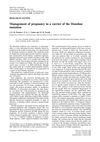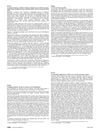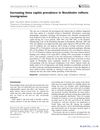Search
for
Sort by
Research
30 / 1000+ results
research Identification of a Recurrent Nonsense Mutation in HR Gene Responsible for Atrichia with Papular Lesions in Two Kashmiri Families
A mutation in the HR gene causes a rare form of irreversible hair loss in two Kashmiri families. Whole exome sequencing is effective for finding such mutations.

research The Current Landscape for Direct-to-Consumer Genetic Testing: Legal, Ethical, and Policy Issues
The document concludes that the fast-growing direct-to-consumer genetic testing market lacks sufficient regulation, posing risks to consumers due to questionable test quality and accuracy.

research Abstracts From The 55th European Society Of Human Genetics Conference: E-Posters
Rare ULBP3 gene changes may raise the risk of Alopecia areata, a certain FAS gene deletion could cause a dysfunctional protein in an immune disorder, and having one copy of a specific genetic deletion is okay, but two copies cause sickle cell disease.
research Expanding on the Phenotypic Spectrum of Woodhouse-Sakati Syndrome Due to Founder Pathogenic Variant in DCAF17: Report of 58 Additional Patients from Qatar and Literature Review
Woodhouse-Sakati syndrome shows varied symptoms, including hair loss and diabetes, and is common in Qatar due to a specific genetic variant.

research From Piezoelectric Nanogenerator to Non-Invasive Medical Sensor: A Review
Piezoelectric Nanogenerators are promising for non-invasive health monitoring but need efficiency and durability improvements.

research Adrenal 21-Hydroxylase Gene Mutations in Slovenian Hyperandrogenic Women: Evaluation of Corticotrophin Stimulation and HLA Polymorphisms in Screening for Carrier Status
The study concluded that testing hormone levels after stimulation is not reliable for identifying carriers of 21-hydroxylase deficiency; genetic testing is necessary.

research Nonclassic Congenital Adrenal Hyperplasia and the Heterozygote Carrier
Identifying nonclassic congenital adrenal hyperplasia and carriers of CYP21 mutations is challenging, and genetic counseling is recommended due to their prevalence.

research Congenital Adrenal Hyperplasia: A Detailed Review of 21-Hydroxylase Deficiency
CAH is a genetic disorder affecting cortisol production and causing hormonal imbalances, with treatment and diagnosis varying by form and symptoms.
research Highly Prevalent LIPH Founder Mutations Causing Autosomal Recessive Woolly Hair/Hypotrichosis in Japan and the Genotype/Phenotype Correlations
LIPH mutations in Japan cause varying degrees of hair loss and woolly hair.

research A Frameshift Insertion in SGK3 Leads to Recessive Hairlessness in Scottish Deerhounds: A Candidate Gene for Human Alopecia Conditions
A genetic mutation in the SGK3 gene causes hairlessness in Scottish Deerhounds and may relate to human hair loss.

research Niosomes as a Vesicular Carrier for Topical Administration of Minoxidil: Formulation and In Vitro Assessment
Niosomes improve minoxidil skin penetration for hair loss treatment.

research Screening for 21-Hydroxylase-Deficient Nonclassic Adrenal Hyperplasia Among Hyperandrogenic Women: A Prospective Study
Testing basal 17-HP levels is a good way to screen for nonclassic adrenal hyperplasia in women with high androgen levels.

research Management of Pregnancy in a Carrier of the Donohue Mutation
Pregnancies in a woman with the Donohue mutation were managed with genetic testing, resulting in three healthy infants.

research Niosomes as a Promising Carrier for Topical Drug Delivery
Niosomes are promising for skin drug delivery, offering benefits like improved drug penetration and stability.

research Niosomes as Carriers in Dermal Drug Delivery
Niosomes are a promising and effective way to deliver drugs through the skin.

research Review of Hair Follicle Dermal Papilla Cells as In Vitro Screening Model for Hair Growth
Dermal Papilla cells are a promising tool for evaluating hair growth treatments.

research Developing Optical Biometrics Using Optical Coherence Tomography for Medical Screening and Diagnosis
OCT can effectively screen and diagnose various medical conditions non-invasively.

research FOXN1 Italian Founder Mutation in Indian Family: Implications in Prenatal Diagnosis
A rare genetic mutation found in an Indian family can be detected through prenatal screening.

research Genetic Screening of Non-Classic CAH Females with Hyperandrogenemia Identifies a Novel CYP11B1 Gene Mutation
A new mutation in the CYP11B1 gene was found in a woman with mild hyperandrogenemia, a rare cause of non-classic congenital adrenal hyperplasia.

research Screening the Chemical Composition and Bioactivity of Cerasus Serrulata Flower Extracts Using Two Extraction Methods
Cerasus serrulata flower extracts have strong antibacterial and antioxidant effects and may help prevent hair loss.

research Skin Targeting of an Optimized Caffeine Nanostructured Lipid Carrier With Improved Efficiency Against Chemotherapy-Induced Alopecia
The new caffeine cream works better for hair growth than existing products.

research Dermatologic Applications of Direct-to-Consumer Genomic Analysis
Living near more dermatologists and using certain cancer screening tests lowers the chance of being diagnosed with advanced skin cancer.

research Activation of the Integrated Stress Response in Human Hair Follicles
Blocking the Mitochondrial Pyruvate Carrier causes stress in hair follicles, which can be reduced by an ISR inhibitor.
research Ethosomes: An Exciting and Promising Alcoholic Carrier System for Treating Androgenic Alopecia
Ethosomes are a promising method for treating hair loss by delivering drugs directly to the scalp.

research Skin Targeting of an Optimized Caffeine Nanostructured Lipid Carrier with Improved Efficiency Against Chemotherapy-Induced Alopecia
The optimized caffeine formula improved hair growth and penetrated all skin layers.

research Microneedles Mediated Bioinspired Lipid Nanocarriers for Targeted Treatment of Alopecia
A new hair loss treatment uses tiny needles to deliver a drug-loaded lipid carrier, promoting hair growth more effectively than current treatments.

research Ajuga Reptans L. Herb Extracts: Phytochemical Composition And Pharmacological Activity Screening
Ajuga reptans L. extracts have strong antioxidant, anti-inflammatory, liver-protective, antimicrobial, and wound-healing properties.

research Production of Mannosylerythritol Lipids and Their Application in Cosmetics
Mannosylerythritol lipids are good for skin and hair care products.

research Increasing Tinea Capitis Prevalence in Stockholm Reflects Immigration
The rise in tinea capitis cases in Stockholm is linked to increased African immigration.